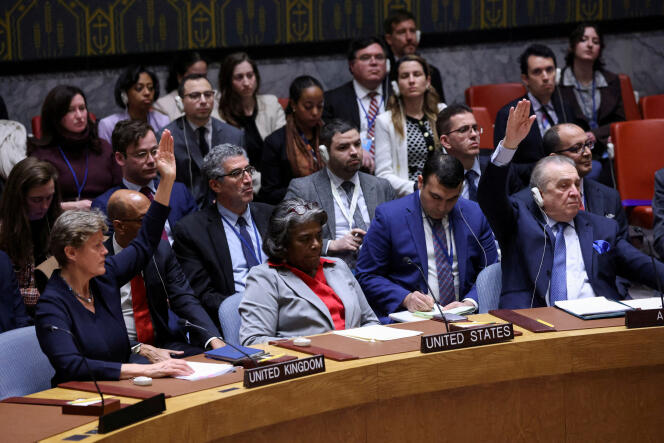


After five and a half months of deadlock, the United Nations (UN) Security Council finally adopted a resolution calling for an "immediate ceasefire" in Gaza, on Monday, March 25. This text only applies to the month of Ramadan, which began two weeks ago, on March 11. Its implementation on the ground remains highly uncertain, even if UN Secretary General Antonio Guterres said that it would be "unforgivable" to ignore it. Nonetheless, this resolution represents the first concrete gesture by the Biden administration to take some critical distance from the Israeli military operation. More than 32,000 people, mostly civilians, have been killed in Gaza.
The vote on the resolution, presented by the 10 non-permanent members of the Security Council and supported by four permanent members, was made possible by the abstention of the US. It did not join the other members due to the absence of an explicit condemnation of Hamas. But the result is the same: Israel is exposed and alone. The text removes one of the principles to which Washington was clinging to, that of linking the release of the 130 hostages remaining in the hands of the Palestinian movement to a temporary ceasefire, while calling for both.
This unprecedented step, which the White House was at pains to play down, immediately triggered an open crisis between Israel and its only major supporter in the war. Benjamin Netanyahu decided to cancel the trip to Washington of his closest aides, Minister for Strategic Affairs Ron Dermer and National Security Adviser Tzachi Hanegbi. They had only a political roadmap, which consisted of listening politely to the American ally about alternatives to a large-scale ground operation at Rafah, in the south of the Gaza Strip.
"The United States has abandoned its policy in the UN today," Netanyahu's office reacted in a statement on Monday, adding, "Today's resolution gives Hamas hope that international pressure will force Israel to accept a ceasefire without the release of our hostages, thus harming both the war effort and the effort to release the hostages." Without using the vocabulary of treason, the prime minister implied that his country was being abandoned. It was a way of presenting himself as the only bulwark against American pressure.
For his part, American National Security Communications Advisor John Kirby felt that the Israeli leader was seeking "to create a perception of daylight here when they don't need to do that." Kirby stressed the "non-binding" nature of the resolution, which will have "no impact at all on Israel's ability to continue to go after Hamas."
You have 63.67% of this article left to read. The rest is for subscribers only.
